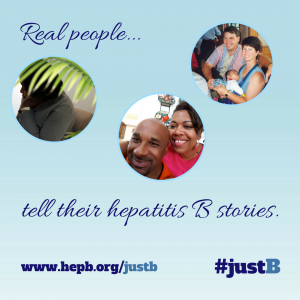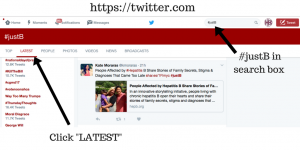 The Hepatitis B Foundation is proud to launch its storytelling campaign, sharing the stories of people living with and affected by hepatitis B. Join the Twitter interview at 2 p.m. (EST), Tuesday, May 16, hosted by the Hepatitis B Foundation and StoryCenter.
The Hepatitis B Foundation is proud to launch its storytelling campaign, sharing the stories of people living with and affected by hepatitis B. Join the Twitter interview at 2 p.m. (EST), Tuesday, May 16, hosted by the Hepatitis B Foundation and StoryCenter.
We will introduce three of our storytellers and their stories. Join the Twitter interview with the hashtag #justB and hear the poignant stories of real people living with hep B.
We will be introducing Jason, Bunmi and Maureen K. Jason, was in a difficult place in his life with addiction and depression when he learned of his hepatitis B and sought treatment. Bunmi, originally from Nigeria, talks about the loss of her father to hepatitis B- related liver cancer and the unwillingness of her family to talk about his disease. Maureen’s hepatitis B journey began with the adoption of her daughter, and the struggle with disclosure with family and friends. These brave storytellers are ready to put an end to the silence surrounding hepatitis B.
Below are the topics scheduled for discussion during the Twitter interview. How can you contribute to the conversation? Please support Jason, Bunmi and Maureen K. as they disclose their hepatitis B stories on social media. Consider sharing parts of your hep B story or pose a question. Join the conversation with the hashtag #justB.
T1. Tell us about hepatitis B, the storytelling campaign and what the foundation hopes to achieve for those affected by hepatitis B.
T2. What makes hepatitis B different from other diseases, and how do these stories highlight the challenges associated with hepatitis B?
T3. We’d like to open it up to our storytellers. Please tell us about your story, and what makes hepatitis B different from other diseases.
T4. How has hepatitis B affected your life?
T5. What made you decide to share your hepatitis B story? Were you concerned with the stigma associated with hepatitis B?
T6. Describe your experience meeting with others impacted by hepatitis B.
T7. If there is one message you would like to get across to others about coping with #hepatitis B, what would it be?
T8: What would you tell others that are struggling with whether or not they should share their hepatitis B story?
Co-hosts and special guest handles include:
- Hepatitis B Foundation – @hepbfoundation
- Story Center – @Storycenter
- Jason – @jlccrum
- Bunmi – @Bunmi
- Maureen – @HepBaware
Be sure to watch Jason, Bunmi and MaureenK‘s stories.
Are you just getting started with Twitter and want to know how to join the conversation? Type #justB in the search box of the Twitter application and click on the “latest option” to follow the twitter view.

You can prepare any questions or tweets you might have for the above participants in advance, or you can also tweet on the fly, re-tweet, or Like a tweet from the chat.
The topics are labeled T1, T2, etc. so please respond/answer specific topic by using A1, A2, etc. in front of your tweets. Remember to include the #justB hashtag, which is not case sensitive, in all of your tweets.
Looking forward to sharing the stories of our guests on the Twitter view. Please welcome them by joining the conversation!



 “We were left to connect the dots because the medical profession is failing to address an epidemic that kills more than 700,000 people a year,” he explained. “It’s bad enough that hepatitis B is a silent killer with few symptoms until it’s too late. It’s also ignored by Asian cultures that consider talk about deadly diseases to be taboo.”
“We were left to connect the dots because the medical profession is failing to address an epidemic that kills more than 700,000 people a year,” he explained. “It’s bad enough that hepatitis B is a silent killer with few symptoms until it’s too late. It’s also ignored by Asian cultures that consider talk about deadly diseases to be taboo.”